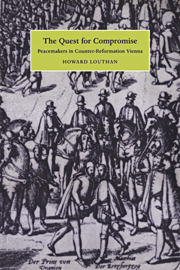Book contents
- Frontmatter
- Contents
- List of illustrations
- Acknowledgments
- A political and cultural chronology
- List of abbreviations
- Introduction
- PART I THE EMERGENCE OF AN IRENIC COURT
- PART II MAXIMILIAN II AND THE HIGH POINT OF IRENICISM
- PART III THE FAILURE OF IRENICISM
- Conclusion: Storm clouds on the horizon: from the great milk war to the Thirty Years War
- Epilogue: The wider circle of irenicism
- Select bibliography
- Index
- CAMBRIDGE STUDIES IN EARLY MODERN HISTORY
Epilogue: The wider circle of irenicism
Published online by Cambridge University Press: 03 December 2009
- Frontmatter
- Contents
- List of illustrations
- Acknowledgments
- A political and cultural chronology
- List of abbreviations
- Introduction
- PART I THE EMERGENCE OF AN IRENIC COURT
- PART II MAXIMILIAN II AND THE HIGH POINT OF IRENICISM
- PART III THE FAILURE OF IRENICISM
- Conclusion: Storm clouds on the horizon: from the great milk war to the Thirty Years War
- Epilogue: The wider circle of irenicism
- Select bibliography
- Index
- CAMBRIDGE STUDIES IN EARLY MODERN HISTORY
Summary
Though this survey of the Habsburg via media has covered a broad range of cultural and intellectual activity at the Viennese court, its scope has been necessarily selective. I have chosen to focus on the contributions of a few individuals whose work I deem representative of the movement as a whole. A more thorough study of irenicism, however, would need to consider a number of other figures who were also inspired by the ideals of moderation and compromise. In closing I will highlight several of these courtiers who merit further attention for a fuller understanding of the Empire's middle way.
The slow process of political centralization that began in the reign of Ferdinand I warrants closer examination. Challenged in the east by the Turk and within his own domains by his restive subjects, the emperor initiated a series of administrative reforms to consolidate his power and authority. The aulic council, the treasury and the war council were all created under Ferdinand's leadership. During this period the imperial vice-chancellor slowly emerged as the most important figure in Vienna's growing bureaucracy. He was the most powerful member of the aulic council and assumed active leadership of the imperial chancellery. He played a critical role in the long struggle of the Austrian Habsburgs to solidify their position and expand their influence in the Empire and the Erblande.
George Sigismund Seld, a councilor of Charles V and advisor of Ferdinand I, was the first imperial vice-chancellor. A proponent of confessional reunion, Seld wooed the Reich's Protestant estates and encouraged their participation at Trent. He understood their basic grievances and lamented Rome's reluctance to deal honestly with the problems besetting the church.
- Type
- Chapter
- Information
- The Quest for CompromisePeacemakers in Counter-Reformation Vienna, pp. 163 - 166Publisher: Cambridge University PressPrint publication year: 1997



